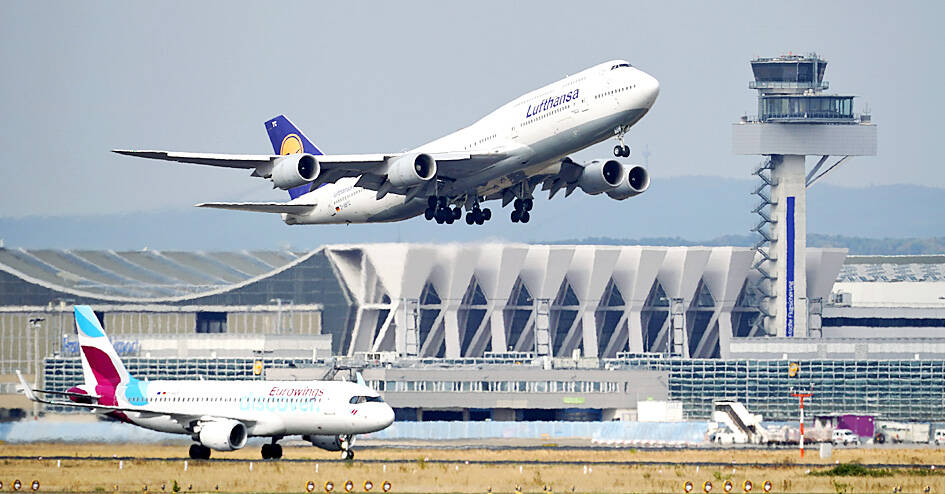Germany raised 760 million euros (US$760 million) from the sale of the state’s full stake in Deutsche Lufthansa AG, unwinding all of the holding it took to keep the flagship carrier afloat during the COVID-19 pandemic.
The German Economic Stabilization Fund (WSF) disposed of its remaining 9.92 percent of Europe’s largest airline via a placement with international investors, the German government said in a statement.
The government earlier on Tuesday announced the sale of a 6.2 percent holding.

Photo: EPA-EFE
“The total proceeds of 1.07 billion euros generated for the WSF from the sale of its stake significantly exceed the 306 million euros invested to acquire it,” said German Finance Agency Director Jutta Doenges, who is responsible for the fund.
With this outcome, “the participation of the WSF ends and the company is back in private hands,” she said.
The shares traded 2 percent lower early yesterday in Frankfurt, Germany, and were little changed for the year to date.
Lufthansa in November last year repaid the last of its 9 billion euros bailout ahead of schedule, enabling the government to pare its stake at a significant profit.
The state in 2020 stepped in to rescue the airline after pandemic-related travel restrictions all but grounded air travel.
Germany’s richest man might have been one of the buyers, after saying he wants to acquire more shares in Europe’s biggest airline.
Billionaire investor Klaus-Michael Kuehne is looking to boost his 15.01 percent stake according to a filing last week, after investing a chunk of a fortune he made in logistics into the carrier.
The latest developments for the carrier come shortly after it reached an agreement that raises pay for pilots and excludes strikes for about a year in return.
The airline has been wrestling with labor disputes that exacerbated a chaotic summer travel season.

Merida Industry Co (美利達) has seen signs of recovery in the US and European markets this year, as customers are gradually depleting their inventories, the bicycle maker told shareholders yesterday. Given robust growth in new orders at its Taiwanese factory, coupled with its subsidiaries’ improving performance, Merida said it remains confident about the bicycle market’s prospects and expects steady growth in its core business this year. CAUTION ON CHINA However, the company must handle the Chinese market with great caution, as sales of road bikes there have declined significantly, affecting its revenue and profitability, Merida said in a statement, adding that it would

i Gasoline and diesel prices at fuel stations are this week to rise NT$0.1 per liter, as tensions in the Middle East pushed crude oil prices higher last week, CPC Corp, Taiwan (台灣中油) and Formosa Petrochemical Corp (台塑石化) said yesterday. International crude oil prices last week rose for the third consecutive week due to an escalating conflict between Israel and Iran, as the market is concerned that the situation in the Middle East might affect crude oil supply, CPC and Formosa said in separate statements. Front-month Brent crude oil futures — the international oil benchmark — rose 3.75 percent to settle at US$77.01

RISING: Strong exports, and life insurance companies’ efforts to manage currency risks indicates the NT dollar would eventually pass the 29 level, an expert said The New Taiwan dollar yesterday rallied to its strongest in three years amid inflows to the nation’s stock market and broad-based weakness in the US dollar. Exporter sales of the US currency and a repatriation of funds from local asset managers also played a role, said two traders, who asked not to be identified as they were not authorized to speak publicly. State-owned banks were seen buying the greenback yesterday, but only at a moderate scale, the traders said. The local currency gained 0.77 percent, outperforming almost all of its Asian peers, to close at NT$29.165 per US dollar in Taipei trading yesterday. The

RECORD LOW: Global firms’ increased inventories, tariff disputes not yet impacting Taiwan and new graduates not yet entering the market contributed to the decrease Taiwan’s unemployment rate last month dropped to 3.3 percent, the lowest for the month in 25 years, as strong exports and resilient domestic demand boosted hiring across various sectors, the Directorate-General of Budget, Accounting and Statistics (DGBAS) said yesterday. After seasonal adjustments, the jobless rate eased to 3.34 percent, the best performance in 24 years, suggesting a stable labor market, although a mild increase is expected with the graduation season from this month through August, the statistics agency said. “Potential shocks from tariff disputes between the US and China have yet to affect Taiwan’s job market,” Census Department Deputy Director Tan Wen-ling